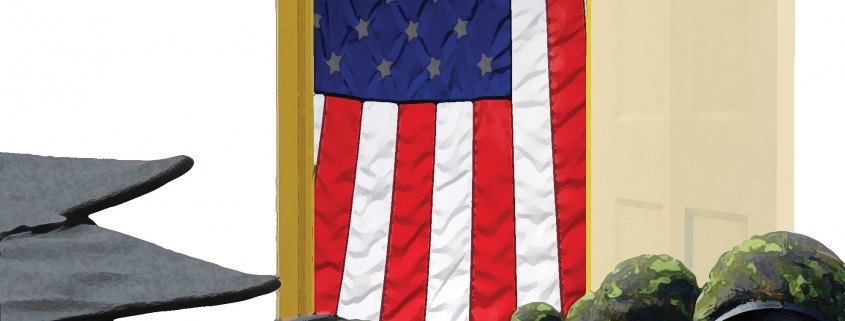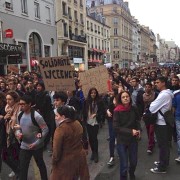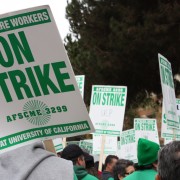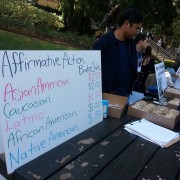The Path to Citizenship: If the DREAM Act passes, undocumented hopefuls must decide between enrollment or enlistment
Can you imagine paying $20,000 or more for your tuition without any loans or financial aid? Can you imagine having to choose between eating or buying your textbooks for the quarter? Can you imagine having to take public transportation for up to four hours just to get to and from UCLA? Can you imagine being undocumented?
This is a reality that many undocumented students face every day. Brought to the US at a young age, many have excelled academically, with over 65,000 of them graduating from high schools every year.
The Development, Relief and Education for Alien Minors Act (DREAM Act) would open the door to young people whose parents brought them to this country as children without proper documentation. If they complete two years at a four-year institution, obtain a degree from a two-year community college, or serve at least two years in the military and show good moral character, the bill would provide them a pathway to earn US citizenship.
Although the DREAM Act would benefit some undocumented students, not everyone fully supports it. Those who support the DREAM Act, including anti-war and immigrant rights activists, became opponents of the bill because of the military component. They believe that enlisting in the military to obtain citizenship would contribute to the recruitment of undocumented students who will be targeted and drafted at high numbers.
The debate became more controversial when the DREAM Act was attached to a defense authorization bill by longtime supporter of the DREAM Act, Nevada Sen. Harry Reid. The bill is enacted each year to specify the budget and expenditures of the US Department of Defense. On Sept. 21, 2010 the bill fell four votes short of the 60 needed to pass.
“There is a huge conspiracy theory that the DREAM Act will recruit more people in the military, but if that was the case the DREAM Act would have easily been passed through the defense bill. It would have been favored by all Republicans, but the opposite happened. The DREAM Act actually stalled the defense bill. The reality and the theory don’t make sense,” said Nancy Meza, UCLA alumna and the Media and Communications Chair for DREAM Team Los Angeles, a coalition of organizations in the Los Angeles area supporting the DREAM Act.
The military component is seen as a draft that will increase military recruitment targeting undocumented students that are typically of low socioeconomic status. “The DREAM Act is a way to bring more of these undocumented [students] into the ranks, they understand that college is an expensive alternative for a lot of these folks so they’re offering the military,” said Marco Amador, a Los Angeles community organizer and collaborator of the film “Yo Soy El Army: America’s New Military Caste,” which explores the effects of the militarization of immigrant communities.
“We need to acknowledge that there has been military recruitment in our communities even before the DREAM Act was drafted,” said Meza. It’s necessary also to take into account that although military recruitment has been occurring in our communities and undocumented students are not eligible for any federal financial aid, they are still graduating at the top of their high school class and going on to higher education. For undocumented youth, the benefits of the DREAM Act would be enormous.
The DREAM Act is offering students a choice between pursuing higher education and enlisting in the military. In an interview on democracynow.org, Gabriela Pacheco, a 25-year-old student from Ecuador who grew up undocumented in Florida said, “I believe that for a lot of the students graduating from high school their desire is to go to college, and it’s what’s being proven right now.” Earlier this year, she and three other students walked 1,500 miles from Miami to Washington, DC, in what was called the “Trail of Dreams” to bring awareness to the DREAM Act.
Leisy Abrego, Assistant Professor at UCLA’s César E. Chávez Department of Chicana and Chicano Studies and leading scholar on undocumented students, made her decision to support the bill on loyalty to students she knows have worked hard to pass the DREAM Act.
“[I] don’t support the military component, but based on the political reality that we’re in, I do support [the DREAM Act],” said Abrego.
The DREAM Act also receives support from students and those in the military. “I definitely support the DREAM Act as it is with the military component,” said Army Reserve member and third-year Chicana and Chicano studies student Margarita Peralta. Peralta said she didn’t consider herself being heavily recruited. “It’s a decision you come to yourself,” she said.
There are undocumented students that want to join the military as a personal choice. For example, David Cho, a fourth-year international finance student at UCLA, said publically at the Campus Progress National Conference that he is undocumented and wants to serve in the U.S. Air Force.
The DREAM Act is at a stage where it has the highest likelihood of passing in the last 10 years. Not supporting the DREAM Act would only minimize the efforts undocumented have made and the risks they have taken. Undocumented students have been the ones that put their lives on the line. It is the undocumented students that should have that personal choice whether they decide to go on to higher education or if they want to enlist in the military.
“As DREAMers we are ready and willing to take the responsibility about educating our community. We see a hurdle; we don’t see a road block,” said Meza.
This is not an easy choice but when have the choices for undocumented students ever been easy?












Leave a Reply
Want to join the discussion?Feel free to contribute!